大学英语创意阅读4翻译1-2
- 格式:doc
- 大小:36.00 KB
- 文档页数:10
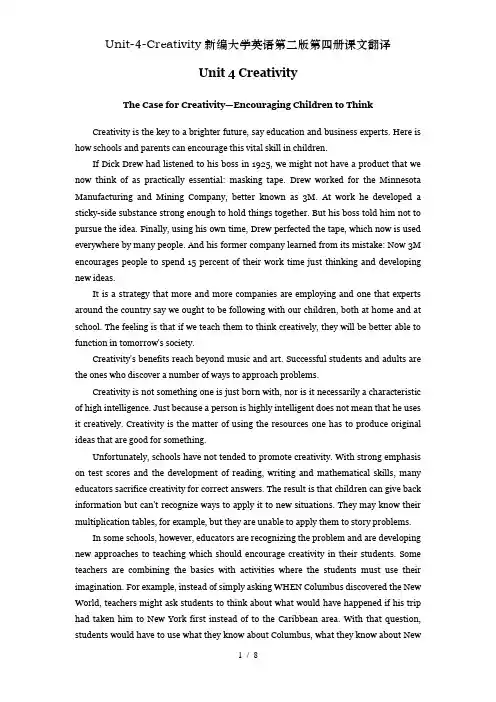
Unit 4 CreativityThe Case for Creativity—Encouraging Children to ThinkCreativity is the key to a brighter future, say education and business experts. Here is how schools and parents can encourage this vital skill in children.If Dick Drew had listened to his boss in 1925, we might not have a product that we now think of as practically essential: masking tape. Drew worked for the Minnesota Manufacturing and Mining Company, better known as 3M. At work he developed a sticky-side substance strong enough to hold things together. But his boss told him not to pursue the idea. Finally, using his own time, Drew perfected the tape, which now is used everywhere by many people. And his former company learned from its mistake: Now 3M encourages people to spend 15 percent of their work time just thinking and developing new ideas.It is a strategy that more and more companies are employing and one that experts around the country say we ought to be following with our children, both at home and at school. The feeling is that if we teach them to think creatively, they will be better able to function in tomorrow's society.Creativity's benefits reach beyond music and art. Successful students and adults are the ones who discover a number of ways to approach problems.Creativity is not something one is just born with, nor is it necessarily a characteristic of high intelligence. Just because a person is highly intelligent does not mean that he uses it creatively. Creativity is the matter of using the resources one has to produce original ideas that are good for something.Unfortunately, schools have not tended to promote creativity. With strong emphasis on test scores and the development of reading, writing and mathematical skills, many educators sacrifice creativity for correct answers. The result is that children can give back information but can't recognize ways to apply it to new situations. They may know their multiplication tables, for example, but they are unable to apply them to story problems.In some schools, however, educators are recognizing the problem and are developing new approaches to teaching which should encourage creativity in their students. Some teachers are combining the basics with activities where the students must use their imagination. For example, instead of simply asking WHEN Columbus discovered the New World, teachers might ask students to think about what would have happened if his trip had taken him to New York first instead of to the Caribbean area. With that question, students would have to use what they know about Columbus, what they know about NewYork, and what they know about the Caribbean. Teachers feel that even if the answers seem silly, it's OK, that sometimes being silly is an essential step toward creativity. In the classroom as well as at home, children must have the right to have crazy thoughts, experts say. Then it is up to parents and teachers to work with the children to develop those thoughts into workable ideas. The best strategy is to encourage children by asking them questions, meanwhile praising their ideas and new thoughts. Experts say that it is important to create an atmosphere in which there is no risk in being creative—a place where wild ideas are honored and valued, never scorned or dismissed.There are things that parents can do at home to encourage creativity. They can involve children in decision-making if the problem is appropriate, asking the child for suggestions. Parents can help their children to understand the consequences of various decisions. Parents should also encourage their children to talk out loud about things they are doing. Thinking and language skills are closely related. Talking out loud improves language skills and thinking skills.Having a sense of humor is also important in helping to develop creativity in a child. When parents show a sense of humor, children can see creativity in its purest form. By its nature, humor crosses conventional boundaries and breaks patterns. Creativity often does the same.It is important to give children choices. From the earliest age, children should be allowed to make decisions and understand their consequences. Even if it's choosing between two food items for lunch, decision-making helps thinking skills. As children grow older, parents should let their children decide how to use their time or spend their money, but not automatically help them too much if they make the wrong decision. This may be confusing for the child, but that is all right. This is because one of the most important traits of creative people is a very strong motivation to make order out of confusion.关于创造力的培养——鼓励孩子思考1 教育界和商业界的专家们说, 具有创造性是通向光明前程的关键。
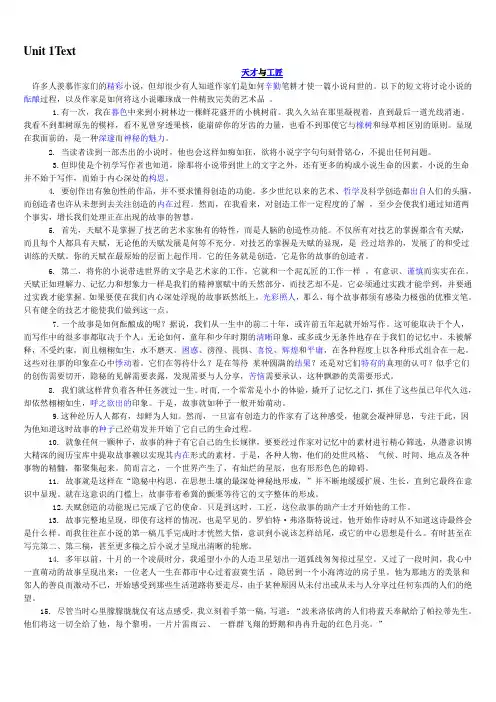
Unit 1Text天才与工匠许多人羡慕作家们的精彩小说,但却很少有人知道作家们是如何辛勤笔耕才使一篇小说问世的。
以下的短文将讨论小说的酝酿过程,以及作家是如何将这小说雕琢成一件精致完美的艺术品。
1.有一次,我在暮色中来到小树林边一棵鲜花盛开的小桃树前。
我久久站在那里凝视着,直到最后一道光线消逝。
我看不到那树原先的模样,看不见曾穿透果核,能崩碎你的牙齿的力量,也看不到那使它与橡树和绿草相区别的原则。
显现在我面前的,是一种深邃而神秘的魅力。
2. 当读者读到一部杰出的小说时,他也会这样如痴如狂,欲将小说字字句句刻骨铭心,不提出任何问题。
3.但即使是个初学写作者也知道,除那将小说带到世上的文字之外,还有更多的构成小说生命的因素,小说的生命并不始于写作,而始于内心深处的构思。
4. 要创作出有独创性的作品,并不要求懂得创造的功能。
多少世纪以来的艺术、哲学及科学创造都出自人们的头脑,而创造者也许从未想到去关注创造的内在过程。
然而,在我看来,对创造工作一定程度的了解,至少会使我们通过知道两个事实,增长我们处理正在出现的故事的智慧。
5. 首先,天赋不是掌握了技艺的艺术家独有的特性,而是人脑的创造性功能。
不仅所有对技艺的掌握都含有天赋,而且每个人都具有天赋,无论他的天赋发展是何等不充分。
对技艺的掌握是天赋的显现,是经过培养的,发展了的和受过训练的天赋。
你的天赋在最原始的层面上起作用。
它的任务就是创造。
它是你的故事的创造者。
6. 第二,将你的小说带进世界的文字是艺术家的工作,它就和一个泥瓦匠的工作一样,有意识、谨慎而实实在在。
天赋正如理解力、记忆力和想象力一样是我们的精神禀赋中的天然部分,而技艺却不是。
它必须通过实践才能学到,并要通过实践才能掌握。
如果要使在我们内心深处浮现的故事跃然纸上,光彩照人,那么,每个故事都须有感染力极强的优雅文笔。
只有健全的技艺才能使我们做到这一点。
7.一个故事是如何酝酿成的呢?据说,我们从一生中的前二十年,或许前五年起就开始写作。
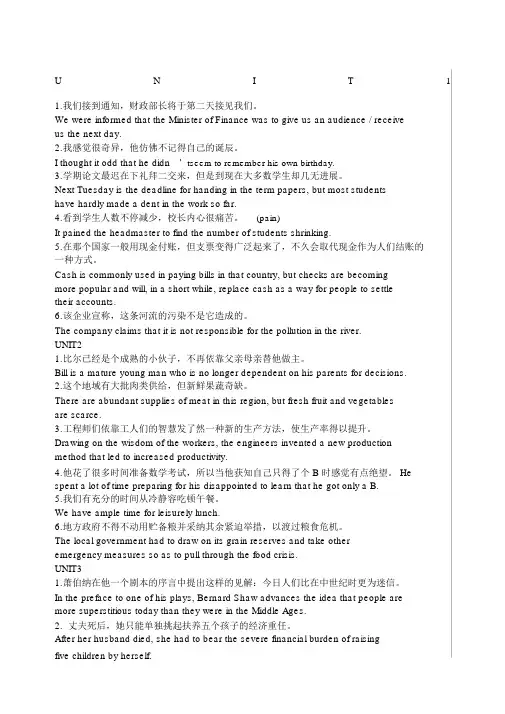
U N I T11.我们接到通知,财政部长将于第二天接见我们。
We were informed that the Minister of Finance was to give us an audience / receiveus the next day.2.我感觉很奇异,他仿佛不记得自己的诞辰。
I thought it odd that he didn’tseem to remember his own birthday.3.学期论文最迟在下礼拜二交来,但是到现在大多数学生却几无进展。
Next Tuesday is the deadline for handing in the term papers, but most studentshave hardly made a dent in the work so far.4.看到学生人数不停减少,校长内心很痛苦。
(pain)It pained the headmaster to find the number of students shrinking.5.在那个国家一般用现金付账,但支票变得广泛起来了,不久会取代现金作为人们结账的一种方式。
Cash is commonly used in paying bills in that country, but checks are becomingmore popular and will, in a short while, replace cash as a way for people to settletheir accounts.6.该企业宣称,这条河流的污染不是它造成的。
The company claims that it is not responsible for the pollution in the river.UNIT21.比尔已经是个成熟的小伙子,不再依靠父亲母亲替他做主。
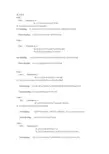
课文答案Unit 1Text: Exercises A. dB. 1.c 2.c 3.b 4.d 5.c 6.b 7.b 8.aD. 1.a 2.b 3.c 4.d 5.b 6.d 7.d 8.b9.a10.aFast Reading: 1.a 2.a 3.d 4.c 5.c 6.d 7.c 8.d 9.d 10.c 11.c 12.b 13.c 14.d15.aHome Reading: 1.d 2.c 3.a 4.d 5.c 6.d 7.b 8.b 9.c 10.aUnit 2Text: Exercises A. aB.1.b 2.b 3.c 4.b 5.d 6.b 7.a 8 .b 9.a 10.cD.1.b 2.a 3.a 4.a 5.b 6.a 7.c 8.d 9.cFast Reading: 1.a 2.c 3.d 4.a 5.b 6.c 7.a 8.d 9.d 10.b 11.d 12.c 13.c 14.d 15.bHome Reading: 1.d .2.a 3.d 4.d 5.b 6.d 7.c 8.c 9.d 10.dUnit 3Text: Exercises A. cB. 1.b 2.a 3.b 4.c 5.d 6.b 7.a 8.b 9.bD. 1.a 2.a 3.d 4.b 5.a 6.c 7.c 8.a 9.d 10.b 11.c 12.c 13.a 14.dFast Reading: 1.c 2.b 3.b 4.a 5.b 6.b 7.a 8.d 9.b 10.b 11.b 12.b 13.d 14.a 1 5.dHome Reading: 1.c 2.a 3.a 4.b 5.a 6.b 7.d 8.c 9.bUnit 4Text: Exercises A. bB.1.c 2.d 3.b 4.d 5.b 6.c 7.a 8.d 9.b 10.d 11.cD. 1.d 2.b 3.a 4.a 5.b 6.d 7.b 8.a 9.b 10.dFast Reading: 1.d 2.b 3.c 4.c 5.d 6.b 7.d 8.c 9.b 10.d 11.c 12.a 13.c 14.c 15.d Home Reading: 1.d 2.d 3.c 4.c 5.a 6.d 7.b 8.aUnit 5Text: Exercises A. aB. 1.b 2.c 3.a 4.d 5.b 6.c 7.aD. 1.d 2.c 3.d 4.a 5.b 6.a 7.b 8.d 9.a 10.d 11.b 12.c 13.aFast Reading: 1.b 2.c 3.a 4.c 5.d 6.a 7.c 8.b 9.d 10.c 11.a 12.c 13.c 14.c 15.cHome Reading: 1.c 2.b 3.a 4.d 5.a 6.d 7.b 8.c 9.c 10.aUnit 6Text: Exercises A. bB. 1.b 2.d 3.a 4.a 5.c 6.b 7.c 8.dD. 1.d 2.c 3.a 4.a 5.d 6.c 7.d 8.d 9.b 10.a 11.b 12.cFast Reading: 1.c 2.a 3.d 4.b 5.a 6.b 7.c 8.d 9.a 10.b 11.b 12.d 13.a 14.c 15.cHome Reading: 1.c 2.a 3.b 4.d 5.b 6.a 7.c 8.a 9.c 10.bUnit 7Text: Exercises A. cB. 1.c 2.a 3.a 4.b 5.d 6.a 7.b 8.cD. 1.a 2.d 3.c 4.d 5.a 6.a 7.b 8.b 9.c 10.d 11.a 12.b 13.cFast Reading: 1.a 2.d 3.c 4.b 5.a 6.d 7.b 8.d 9.c 10.b 11.d 12.b 13.b 14.c 15.dHome Reading: 1.d 2.d 3.b 4.d 5.c 6.a 7.b 8.a 9.b 10.cUnit 8Text: Exercises c.B. 1.d 2. c 3.b 4.b 5 a. 6. c 7.a 8.cD. 1. c2.d 3.a 4. c 5. a 6. b 7. d 8. c 9. b 10.b 11.d 12.d 13.d 14.c 15.dFast Reading: 1.a 2.c 3. a 4. a 5. d 6. b 7c . 8. d 9. d 10. c 11.d 12. d 13. d 14.c 15.d Home Reading: 1.a 2. d 3. d 4.d 5.b 6.c 7.d 8. bUnit 9Text: Exercises A. bB. 1.b 2.a 3.d 4.c 5.d 6.a 7.b 8.cD. 1.a 2.c 3.b 4.a 5.c 6.d 7.a 8.b 9.c 10.a 11.c 12.a 13.b 14.c 15.a 16.c17.d 18.b 19.aFast Reading: 1.a 2.ac3.c 4.d 5.b 6.a 7.b 8.c 9.c 10.d 11.c 12.b 13.c 14.a 15.dHome Reading: 1.b 2.c 3.d 4.a 5.c 6.b 7.d 8.a 9.d 10.dUnit 10Text: Exercises A. cB. 1.c 2.b 3.b 4.c 5.b 6.c 7.b 8.b 9.c 10.cD. 1.b 2.a 3.c 4.b 5.a 6.d 7.d 8.a 9.c 10.a 11.c 12.b 13.b 14.aFast Reading: 1.a 2.b 3.b 4.d 5.a 6.c 7.b 8.b 9.d 10.a 11.d 12.c 13.d 14.d 15.bHome Reading: 1.c2.c 3.c4.a 5.d 6.b 7.d 8.d 9.b 10.cUnit 11Text: Exercises A. bB. 1.b 2.a 3.a 4.c 5.d 6.c 7.b 8.cD. 1.d 2.a 3.a 4.d 5.b 6.c 7.b 8.a 9.c 10.aFast Reading: 1.c 2.a 3.b 4.d 5.d 6.a 7.c 8.c 9.d 10.a 11.c 12.c 13.d 14.d 15.bHome Reading: 1.c 2.a 3.c 4.a 5.d 6.b 7.a 8.b 9.a 10.cUnit 12Text: Excises A. bB. 1.d 2.a 3.b 4.d 5.d 6.b 7.c 8.d 9.cD. 1.b 2.a 3.a 4.b 5.b 6.c 7.a 8.b 9.c 10.b 11.b 12.a 13.c 14.b 15.aFast Reading: 1.d 2.d 3.b 4.b 5.b 6.d 7.d 8.c 9.b 10.c 11.c 12.b 13.c 14.d 15.aHome Reading: 1.d 2.c 3.c 4.b 5.d 6.b 7.cUnit 13Text: Exercises bB. 1.a 2.b3.b 4.d5.c 6.a 7. c 8.c 9.cD. 1.a 2.b 3.b 4.a 5.b 6.d 7.a 8.c 9. c10.c 11. d 12. b 13.d 14.aFast Reading: 1.d 2.a 3.d 4.d5.d 6.c 7.b 8.c 9.a 10.a 11.c 12.b 13.b 14.d 15.dHome Reading: 1.b 2.c 3.d 4.c 5.c 6.b 7.cd 8.a d.a 10.b 11.dUnit 14Text: Exercises cB. 1c. 2.d 3.b 4.b 5.d 6.d 7.c 8.d 9.d 10.dD. 1.c. 2.d 3.b 4.a 5. d 6.d 7.a 8. a 9.b 10.a 11.c 12.a 13.a 14.d Fast Reading: 1.a 2.c 3.b 4. a 5.d 6.d 7. d 8.b 9.c 10. c 11.d 12.b 13.c 14. d15.bHome Reading: 1. c2. c 3. c 4. a 5.a 6. c 7.c 8.dUnit 15Text: Exercises A. bB. 1.a 2.d 3.c 4.c 5.a 6.c 7.d 8.b 9.bD. 1.a 2.b 3.c 4.c 5.a 6.b 7.a 8.a 9.d 10.bFast Reading: 1.a 2.c 3.d 4.b 5.a 6.b 7.c 8.c 9.d 10.c 11.c 12.b 13.a 14.d 15.dHome Reading: 1.a 2.c 3.d 4.b 5.c 6.d 7.d 8.b 9.课后翻译Unit 1Text天才与工匠许多人羡慕作家们的精彩小说,但却很少有人知道作家们是如何辛勤笔耕才使一篇小说问世的。
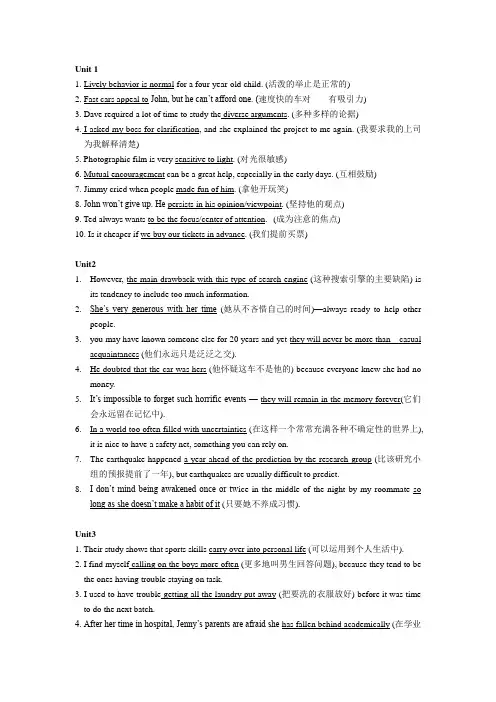
Unit 11. Lively behavior is normal for a four-year-old child. (活泼的举止是正常的)2. Fast cars appeal to John, but he can’t afford one. (速度快的车对······有吸引力)3. Dave required a lot of time to study the diverse arguments. (多种多样的论据)4. I asked my boss for clarification, and she explained the project to me again. (我要求我的上司为我解释清楚)5. Photographic film is very sensitive to light. (对光很敏感)6. Mutual encouragement can be a great help, especially in the early days. (互相鼓励)7. Jimmy cried when people made fun of him. (拿他开玩笑)8. John won’t give up. He persists in his opinion/viewpoint. (坚持他的观点)9. Ted always wants to be the focus/center of attention.(成为注意的焦点)10. Is it cheaper if we buy our tickets in advance. (我们提前买票)Unit21.However, the main drawback with this type of search engine (这种搜索引擎的主要缺陷) isits tendency to include too much information.2.She’s very generous with her time(她从不吝惜自己的时间)—always ready to help otherpeople.3.you may have known someone else for 20 years and yet they will never be more than casualacquaintances (他们永远只是泛泛之交).4.He doubted that the car was hers (他怀疑这车不是他的) because everyone knew she had nomoney.5.It’s impossible to forget such horrific events — they will remain in the memory forever(它们会永远留在记忆中).6.In a world too often filled with uncertainties (在这样一个常常充满各种不确定性的世界上),it is nice to have a safety net, something you can rely on.7.The earthquake happened a year ahead of the prediction by the research group (比该研究小组的预报提前了一年), but earthquakes are usually difficult to predict.8.I don’t mind being awakened once or tw ice in the middle of the night by my roommate solong as she doesn’t make a habit of it (只要她不养成习惯).Unit31. Their study shows that sports skills carry over into personal life (可以运用到个人生活中).2. I find myself calling on the boys more often (更多地叫男生回答问题), because they tend to be the ones having trouble staying on task.3. I used to have trouble getting all the laundry put away (把要洗的衣服放好) before it was time to do the next batch.4. After her time in hospital, Jenny’s parents are afraid she has fallen behind academically (在学业上落后了).5. People are wondering who’s going to take over (谁会接班)when the old president dies.Unit41. I think it is up to him to finish the work (这工作都得由他来完成) no matter how long it takes.2. We decided to sacrifice a trip for a new car (我们决定为买新车而放弃旅行), though it was really hard for us to make the decision.3. He tried not to involve his wife in the management of company (让他的妻子参与公司的管理工作), because in most cases the advantages outweigh the disadvantages.4. It is of vital importance to future generations (对未来几代人都是及其重要的) that open spaces and parklands are protected and maintained to a high standard to keep the city increasingly attractive.5. We have reached the agreement at the meeting that the key to this problem is better planning (解决这个问题的关键是更好的策划)6. I propose pursuing this question further (继续深入讨论这个问题) by considering critically the four theories well-known in this area.7. The house was a completely original design (这房子是完全新颖的设计)---neither the interior nor the exterior was copies of any existing buildings of the kind.8. Through all his life he has made efforts to promote the mutual understanding between the two countries (增进两国间的相互了解).Unit51. One of the reasons they became good friends (他们成为好朋友的其中一个理由) was that they enjoyed the same sports and music.2. We will learn by our own experience what is best, and not by following the footsteps of others (不是靠重复别人的足迹).3. He will play in two tournaments in Japan, which means he will miss the World Cup (这意味着他将错过世界杯) in his home country.4. She wondered whether to say she missed him very much or to continue to keep silent(是否表白自己很想他还是继续保持沉默). She had to think about her relationship again.5. Her mind was soothed by memories of her dad and of the days when she was a little girl living with dad in the country (她还是个小女孩时同父亲一起住在乡下的日子).6. No matter how insignificant the findings were at the time (无论调查结果在当时是多么没有意义), it is important to record all of them properly.7. Constantly being criticized by parents (总是受到父母的批评) can seriously hurt the children and won’t reinforce what the parents try to teach.8. The danger of going too far (做过头的危险) was always present because he was talking too much. But he couldn’t help it.Unit61. He was finally offered the job on the strength of his good memory (凭借他的记忆力好) and the many exams he had passed.2. She favors a bit of adventure as well as a certain degree of self-government when her children’s education is concerned(当涉及到她孩子的教育时).3. Most people who are sick with AIDS want to stay at home, rather than spend time unnecessarily in hospital (而不愿意毫无必要地呆在医院里).4. What if I choose to give small amounts of money regularly over a period of time (在一段时间内定期给少量的钱) instead of donating a large sum once for all?5. I am afraid, Mr. Peterson, the answer is that (答案是这样的) we have to be more efficient than our European competitors.6. The museum does not intend to focus on a particular aspect of modern art (并不打算只关注现代艺术的某个具体方面), but prefers to offer material for the public to study and compare.7. She had decided not to go for a drive on such a windy day even supposing a car was available (即便能搞到一辆车).8. I am well aware of the fact that you have cut yourself off from your past and have started a totally new life(你已经同过去一刀两断,并已经开始全新的生活这一事实).。
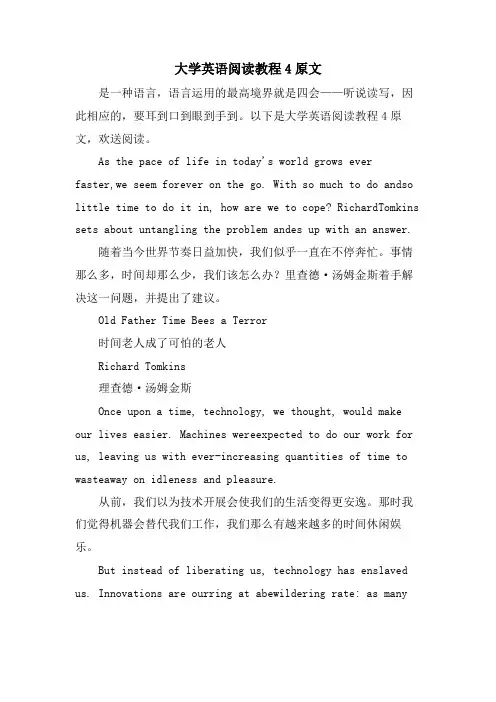
大学英语阅读教程4原文是一种语言,语言运用的最高境界就是四会——听说读写,因此相应的,要耳到口到眼到手到。
以下是大学英语阅读教程4原文,欢送阅读。
As the pace of life in today's world grows everfaster,we seem forever on the go. With so much to do andso little time to do it in, how are we to cope? RichardTomkins sets about untangling the problem andes up with an answer.随着当今世界节奏日益加快,我们似乎一直在不停奔忙。
事情那么多,时间却那么少,我们该怎么办?里查德·汤姆金斯着手解决这一问题,并提出了建议。
Old Father Time Bees a Terror时间老人成了可怕的老人Richard Tomkins理查德·汤姆金斯Once upon a time, technology, we thought, would make our lives easier. Machines wereexpected to do our work for us, leaving us with ever-increasing quantities of time to wasteaway on idleness and pleasure.从前,我们以为技术开展会使我们的生活变得更安逸。
那时我们觉得机器会替代我们工作,我们那么有越来越多的时间休闲娱乐。
But instead of liberating us, technology has enslaved us. Innovations are ourring at abewildering rate: as manynow arrive in a year as once arrived in a millennium. Andas eachinvention arrives, it eats further into our time.但技术开展没有把我们解放出来,而是使我们成为奴隶。

课文答案Unit 1Text: Exercises A. dB. 1.c 2.c 3.b 4.d 5.c 6.b 7.b 8.aD. 1.a 2.b 3.c 4.d 5.b 6.d 7.d 8.b9.a10.aFast Reading: 1.a 2.a 3.d 4.c 5.c 6.d 7.c 8.d 9.d 10.c 11.c 12.b 13.c 14.d15.aHome Reading: 1.d 2.c 3.a 4.d 5.c 6.d 7.b 8.b 9.c 10.aUnit 2Text: Exercises A. aB.1.b 2.b 3.c 4.b 5.d 6.b 7.a 8 .b 9.a 10.cD.1.b 2.a 3.a 4.a 5.b 6.a 7.c 8.d 9.cFast Reading: 1.a 2.c 3.d 4.a 5.b 6.c 7.a 8.d 9.d 10.b 11.d 12.c 13.c 14.d 15.bHome Reading: 1.d .2.a 3.d 4.d 5.b 6.d 7.c 8.c 9.d 10.dUnit 3Text: Exercises A. cB. 1.b 2.a 3.b 4.c 5.d 6.b 7.a 8.b 9.bD. 1.a 2.a 3.d 4.b 5.a 6.c 7.c 8.a 9.d 10.b 11.c 12.c 13.a 14.dFast Reading: 1.c 2.b 3.b 4.a 5.b 6.b 7.a 8.d 9.b 10.b 11.b 12.b 13.d 14.a 1 5.dHome Reading: 1.c 2.a 3.a 4.b 5.a 6.b 7.d 8.c 9.bUnit 4Text: Exercises A. bB.1.c 2.d 3.b 4.d 5.b 6.c 7.a 8.d 9.b 10.d 11.cD. 1.d 2.b 3.a 4.a 5.b 6.d 7.b 8.a 9.b 10.dFast Reading: 1.d 2.b 3.c 4.c 5.d 6.b 7.d 8.c 9.b 10.d 11.c 12.a 13.c 14.c 15.d Home Reading: 1.d 2.d 3.c 4.c 5.a 6.d 7.b 8.aUnit 5Text: Exercises A. aB. 1.b 2.c 3.a 4.d 5.b 6.c 7.aD. 1.d 2.c 3.d 4.a 5.b 6.a 7.b 8.d 9.a 10.d 11.b 12.c 13.aFast Reading: 1.b 2.c 3.a 4.c 5.d 6.a 7.c 8.b 9.d 10.c 11.a 12.c 13.c 14.c 15.cHome Reading: 1.c 2.b 3.a 4.d 5.a 6.d 7.b 8.c 9.c 10.aUnit 6Text: Exercises A. bB. 1.b 2.d 3.a 4.a 5.c 6.b 7.c 8.dD. 1.d 2.c 3.a 4.a 5.d 6.c 7.d 8.d 9.b 10.a 11.b 12.cFast Reading: 1.c 2.a 3.d 4.b 5.a 6.b 7.c 8.d 9.a 10.b 11.b 12.d 13.a 14.c 15.cHome Reading: 1.c 2.a 3.b 4.d 5.b 6.a 7.c 8.a 9.c 10.bUnit 7Text: Exercises A. cB. 1.c 2.a 3.a 4.b 5.d 6.a 7.b 8.cD. 1.a 2.d 3.c 4.d 5.a 6.a 7.b 8.b 9.c 10.d 11.a 12.b 13.cFast Reading: 1.a 2.d 3.c 4.b 5.a 6.d 7.b 8.d 9.c 10.b 11.d 12.b 13.b 14.c 15.dHome Reading: 1.d 2.d 3.b 4.d 5.c 6.a 7.b 8.a 9.b 10.cUnit 8Text: Exercises c.B. 1.d 2. c 3.b 4.b 5 a. 6. c 7.a 8.cD. 1. c2.d 3.a 4. c 5. a 6. b 7. d 8. c 9. b 10.b 11.d 12.d 13.d 14.c 15.dFast Reading: 1.a 2.c 3. a 4. a 5. d 6. b 7c . 8. d 9. d 10. c 11.d 12. d 13. d 14.c 15.d Home Reading: 1.a 2. d 3. d 4.d 5.b 6.c 7.d 8. bUnit 9Text: Exercises A. bB. 1.b 2.a 3.d 4.c 5.d 6.a 7.b 8.cD. 1.a 2.c 3.b 4.a 5.c 6.d 7.a 8.b 9.c 10.a 11.c 12.a 13.b 14.c 15.a 16.c17.d 18.b 19.aFast Reading: 1.a 2.ac3.c 4.d 5.b 6.a 7.b 8.c 9.c 10.d 11.c 12.b 13.c 14.a 15.dHome Reading: 1.b 2.c 3.d 4.a 5.c 6.b 7.d 8.a 9.d 10.dUnit 10Text: Exercises A. cB. 1.c 2.b 3.b 4.c 5.b 6.c 7.b 8.b 9.c 10.cD. 1.b 2.a 3.c 4.b 5.a 6.d 7.d 8.a 9.c 10.a 11.c 12.b 13.b 14.aFast Reading: 1.a 2.b 3.b 4.d 5.a 6.c 7.b 8.b 9.d 10.a 11.d 12.c 13.d 14.d 15.bHome Reading: 1.c2.c 3.c4.a 5.d 6.b 7.d 8.d 9.b 10.cUnit 11Text: Exercises A. bB. 1.b 2.a 3.a 4.c 5.d 6.c 7.b 8.cD. 1.d 2.a 3.a 4.d 5.b 6.c 7.b 8.a 9.c 10.aFast Reading: 1.c 2.a 3.b 4.d 5.d 6.a 7.c 8.c 9.d 10.a 11.c 12.c 13.d 14.d 15.bHome Reading: 1.c 2.a 3.c 4.a 5.d 6.b 7.a 8.b 9.a 10.cUnit 12Text: Excises A. bB. 1.d 2.a 3.b 4.d 5.d 6.b 7.c 8.d 9.cD. 1.b 2.a 3.a 4.b 5.b 6.c 7.a 8.b 9.c 10.b 11.b 12.a 13.c 14.b 15.aFast Reading: 1.d 2.d 3.b 4.b 5.b 6.d 7.d 8.c 9.b 10.c 11.c 12.b 13.c 14.d 15.aHome Reading: 1.d 2.c 3.c 4.b 5.d 6.b 7.cUnit 13Text: Exercises bB. 1.a 2.b3.b 4.d5.c 6.a 7. c 8.c 9.cD. 1.a 2.b 3.b 4.a 5.b 6.d 7.a 8.c 9. c10.c 11. d 12. b 13.d 14.aFast Reading: 1.d 2.a 3.d 4.d5.d 6.c 7.b 8.c 9.a 10.a 11.c 12.b 13.b 14.d 15.dHome Reading: 1.b 2.c 3.d 4.c 5.c 6.b 7.cd 8.a d.a 10.b 11.dUnit 14Text: Exercises cB. 1c. 2.d 3.b 4.b 5.d 6.d 7.c 8.d 9.d 10.dD. 1.c. 2.d 3.b 4.a 5. d 6.d 7.a 8. a 9.b 10.a 11.c 12.a 13.a 14.d Fast Reading: 1.a 2.c 3.b 4. a 5.d 6.d 7. d 8.b 9.c 10. c 11.d 12.b 13.c 14. d15.bHome Reading: 1. c2. c 3. c 4. a 5.a 6. c 7.c 8.dUnit 15Text: Exercises A. bB. 1.a 2.d 3.c 4.c 5.a 6.c 7.d 8.b 9.bD. 1.a 2.b 3.c 4.c 5.a 6.b 7.a 8.a 9.d 10.bFast Reading: 1.a 2.c 3.d 4.b 5.a 6.b 7.c 8.c 9.d 10.c 11.c 12.b 13.a 14.d 15.dHome Reading: 1.a 2.c 3.d 4.b 5.c 6.d 7.d 8.b 9.课后翻译Unit 1Text天才与工匠许多人羡慕作家们的精彩小说,但却很少有人知道作家们是如何辛勤笔耕才使一篇小说问世的。
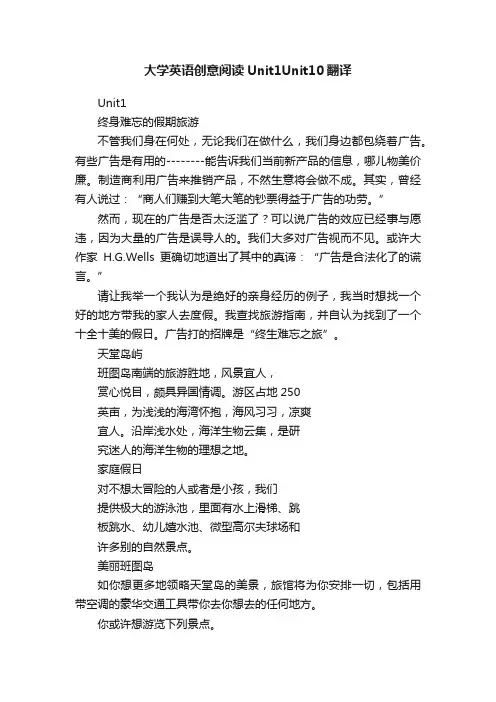
大学英语创意阅读Unit1Unit10翻译Unit1终身难忘的假期旅游不管我们身在何处,无论我们在做什么,我们身边都包绕着广告。
有些广告是有用的--------能告诉我们当前新产品的信息,哪儿物美价廉。
制造商利用广告来推销产品,不然生意将会做不成。
其实,曾经有人说过:“商人们赚到大笔大笔的钞票得益于广告的功劳。
”然而,现在的广告是否太泛滥了?可以说广告的效应已经事与愿违,因为大量的广告是误导人的。
我们大多对广告视而不见。
或许大作家H.G.Wells更确切地道出了其中的真谛:“广告是合法化了的谎言。
”请让我举一个我认为是绝好的亲身经历的例子,我当时想找一个好的地方带我的家人去度假。
我查找旅游指南,并自认为找到了一个十全十美的假日。
广告打的招牌是“终生难忘之旅”。
天堂岛屿班图岛南端的旅游胜地,风景宜人,赏心悦目,颇具异国情调。
游区占地250英亩,为浅浅的海湾怀抱,海风习习,凉爽宜人。
沿岸浅水处,海洋生物云集,是研究迷人的海洋生物的理想之地。
家庭假日对不想太冒险的人或者是小孩,我们提供极大的游泳池,里面有水上滑梯、跳板跳水、幼儿嬉水池、微型高尔夫球场和许多别的自然景点。
美丽班图岛如你想更多地领略天堂岛的美景,旅馆将为你安排一切,包括用带空调的豪华交通工具带你去你想去的任何地方。
你或许想游览下列景点。
旅游一线:古老神秘的塔利湖。
开车从旅游胜地出发,很快就到达这充满浪漫色彩,具有远古宗教气息的塔利湖。
在这儿演绎出了无数的人类祭祀场面,无数对恋人投湖殉情。
人们还常常看见他们的幽灵在湖边徘徊。
旅游二线:岛屿北部的邦威自然保护区。
在这儿能看到岛上野生动植物的奇观异景:奇特植物,珍稀动物。
旅游三线:西海岸奇异的水下洞穴。
从旅游胜地出发,坐上本地人的小船,沿岸而上可到这古老的洞穴。
据说这里是位大魔法师的出生地和埋身之处。
宾至如归在一流的宾馆你自然能享受一流的居住条件。
你将住在采用本地木料、手工建造的单人套间内。
这些单人套间会为你营造“回归自然”的真切氛围。
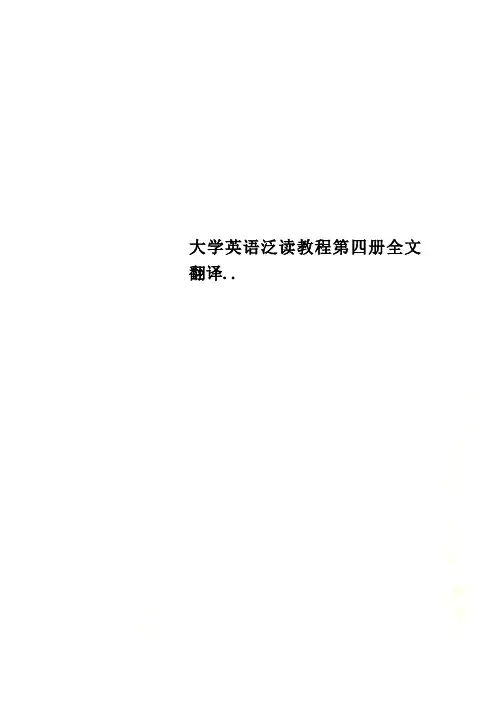
大学英语泛读教程第四册全文翻译..Unit 1Text天才与工匠许多人羡慕作家们的精彩小说,但却很少有人知道作家们是如何辛勤笔耕才使一篇小说问世的。
以下的短文将讨论小说的酝酿过程,以及作家是如何将这小说雕琢成一件精致完美的艺术品。
1.有一次,我在暮色中来到小树林边一棵鲜花盛开的小桃树前。
我久久站在那里凝视着,直到最后一道光线消逝。
我看不到那树原先的模样,看不见曾穿透果核,能崩碎你的牙齿的力量,也看不到那使它与橡树和绿草相区别的原则。
显现在我面前的,是一种深邃而神秘的魅力。
2. 当读者读到一部杰出的小说时,他也会这样如痴如狂,欲将小说字字句句刻骨铭心,不提出任何问题。
3.但即使是个初学写作者也知道,除那将小说带到世上的文字之外,还有更多的构成小说生命的因素,小说的生命并不始于写作,而始于内心深处的构思。
4. 要创作出有独创性的作品,并不要求懂得创造的功能。
多少世纪以来的艺术、哲学及科学创造都出自人们的头脑,而创造者也许从未想到去关注创造的内在过程。
然而,在我看来,对创造工作一定程度的了解,至少会使我们通过知道两个事实,增长我们处理正在出现的故事的智慧。
5. 首先,天赋不是掌握了技艺的艺术家独有的特性,而是人脑的创造性功能。
不仅所有对技艺的掌握都含有天赋,而且每个人都具有天赋,无论他的天赋发展是何等不充分。
对技艺的掌握是天赋的显现,是经过培养的,发展了的和受过训练的天赋。
你的天赋在最原始的层面上起作用。
它的任务就是创造。
它是你的故事的创造者。
6. 第二,将你的小说带进世界的文字是艺术家的工作,它就和一个泥瓦匠的工作一样,有意识、谨慎而实实在在。
天赋正如理解力、记忆力和想象力一样是我们的精神禀赋中的天然部分,而技艺却不是。
它必须通过实践才能学到,并要通过实践才能掌握。
如果要使在我们内心深处浮现的故事跃然纸上,光彩照人,那么,每个故事都须有感染力极强的优雅文笔。
只有健全的技艺才能使我们做到这一点。
7.一个故事是如何酝酿成的呢?据说,我们从一生中的前二十年,或许前五年起就开始写作。
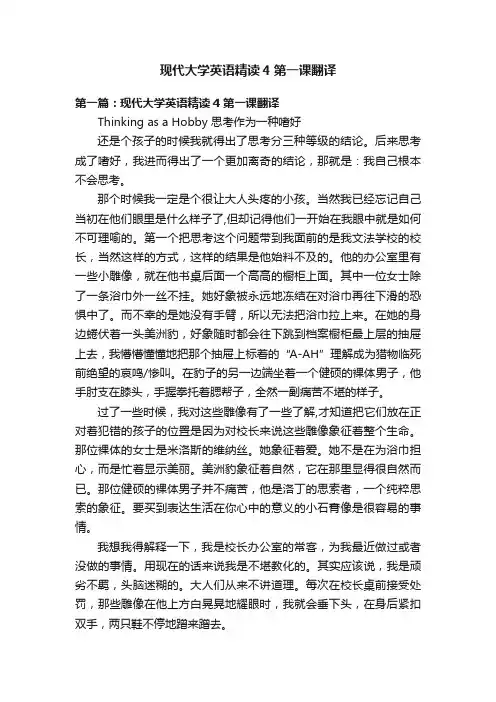
现代大学英语精读4第一课翻译第一篇:现代大学英语精读4 第一课翻译Thinking as a Hobby 思考作为一种嗜好还是个孩子的时候我就得出了思考分三种等级的结论。
后来思考成了嗜好,我进而得出了一个更加离奇的结论,那就是:我自己根本不会思考。
那个时候我一定是个很让大人头疼的小孩。
当然我已经忘记自己当初在他们眼里是什么样子了,但却记得他们一开始在我眼中就是如何不可理喻的。
第一个把思考这个问题带到我面前的是我文法学校的校长,当然这样的方式,这样的结果是他始料不及的。
他的办公室里有一些小雕像,就在他书桌后面一个高高的橱柜上面。
其中一位女士除了一条浴巾外一丝不挂。
她好象被永远地冻结在对浴巾再往下滑的恐惧中了。
而不幸的是她没有手臂,所以无法把浴巾拉上来。
在她的身边蜷伏着一头美洲豹,好象随时都会往下跳到档案橱柜最上层的抽屉上去,我懵懵懂懂地把那个抽屉上标着的“A-AH”理解成为猎物临死前绝望的哀鸣/惨叫。
在豹子的另一边端坐着一个健硕的裸体男子,他手肘支在膝头,手握拳托着腮帮子,全然一副痛苦不堪的样子。
过了一些时候,我对这些雕像有了一些了解,才知道把它们放在正对着犯错的孩子的位置是因为对校长来说这些雕像象征着整个生命。
那位裸体的女士是米洛斯的维纳丝。
她象征着爱。
她不是在为浴巾担心,而是忙着显示美丽。
美洲豹象征着自然,它在那里显得很自然而已。
那位健硕的裸体男子并不痛苦,他是洛丁的思索者,一个纯粹思索的象征。
要买到表达生活在你心中的意义的小石膏像是很容易的事情。
我想我得解释一下,我是校长办公室的常客,为我最近做过或者没做的事情。
用现在的话来说我是不堪教化的。
其实应该说,我是顽劣不羁,头脑迷糊的。
大人们从来不讲道理。
每次在校长桌前接受处罚,那些雕像在他上方白晃晃地耀眼时,我就会垂下头,在身后紧扣双手,两只鞋不停地蹭来蹭去。
校长透过亮晶晶的眼镜片眼神暗淡地看着我,:“我们该拿你怎么办呢?”哦,他们要拿我怎么办呢?我盯着旧地毯更狠命地蹂躏我的鞋。
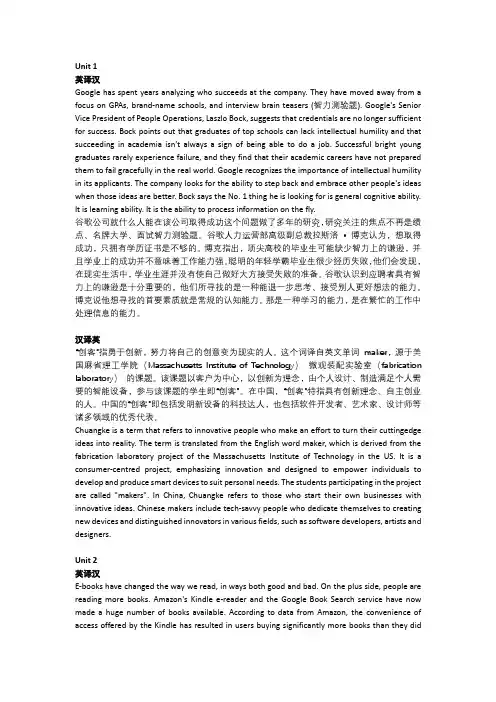
Unit 1英译汉Google has spent years analyzing who succeeds at the company. They have moved away from a focus on GPAs, brand-name schools, and interview brain teasers (智力测验题). Google's Senior Vice President of People Operations, Laszlo Bock, suggests that credentials are no longer sufficient for success. Bock points out that graduates of top schools can lack intellectual humility and that succeeding in academia isn't always a sign of being able to do a job. Successful bright young graduates rarely experience failure, and they find that their academic careers have not prepared them to fail gracefully in the real world. Google recognizes the importance of intellectual humility in its applicants. The company looks for the ability to step back and embrace other people's ideas when those ideas are better. Bock says the No. 1 thing he is looking for is general cognitive ability. It is learning ability. It is the ability to process information on the fly.谷歌公司就什么人能在该公司取得成功这个问题做了多年的研究,研究关注的焦点不再是绩点、名牌大学、面试智力测验题。
课内阅读参考译文及课后习题答案(Book 4)Unit 1享受幽默—什么东西令人开怀?1 听了一个有趣的故事会发笑、很开心,古今中外都一样。
这一现象或许同语言本身一样悠久。
那么,到底是什么东西会使一个故事或笑话让人感到滑稽可笑的呢?2 我是第一次辨识出幽默便喜欢上它的人,因此我曾试图跟学生议论和探讨幽默。
这些学生文化差异很大,有来自拉丁美洲的,也有来自中国的。
我还认真地思考过一些滑稽有趣的故事。
这么做完全是出于自己的喜好。
3 为什么听我讲完一个笑话后,班上有些学生会笑得前仰后合,而其他学生看上去就像刚听我读了天气预报一样呢?显然,有些人对幽默比别人更敏感。
而且,我们也发现有的人很善于讲笑话,而有的人要想说一点有趣的事却要费好大的劲。
我们都听人说过这样的话:―我喜欢笑话,但我讲不好,也总是记不住。
‖有些人比别人更有幽默感,就像有些人更具有音乐、数学之类的才能一样。
一个真正风趣的人在任何场合都有笑话可讲,而且讲了一个笑话,就会从他记忆里引出一连串的笑话。
一个缺乏幽默感的人不可能成为一群人中最受欢迎的人。
一个真正有幽默感的人不仅受人喜爱,而且在任何聚会上也往往是人们注意的焦点。
这么说是有道理的。
4 甚至有些动物也具有幽默感。
我岳母从前经常来我们家,并能住上很长一段时间。
通常她不喜欢狗,但却很喜欢布利茨恩—我们养过的一条拉布拉多母猎犬。
而且,她们的这种喜欢是相互的。
布利茨恩在很小的时候就常常戏弄外祖母,当外祖母坐在起居室里她最喜欢的那张舒适的椅子上时,布利茨恩就故意把她卧室里的一只拖鞋叼到起居室,并在外祖母刚好够不到的地方蹦来跳去,一直逗到外祖母忍不住站起来去拿那只拖鞋。
外祖母从椅子上一起来,布利茨恩就迅速跳上那椅子,从它那闪亮的棕色眼睛里掠过一丝拉布拉多式的微笑,无疑是在说:―啊哈,你又上了我的当。
‖5 典型的笑话或幽默故事由明显的三部分构成。
第一部分是铺垫(即背景),接下来是主干部分(即故事情节),随后便是妙语(即一个出人意料或令人惊讶的结尾)。
精读四 Unit 1 bang the door 猛然敲门 1. cheer His Majesty 向国王陛下欢呼 2. contemplate the statue 凝视那雕像 3. 发明一种新方法/设计 4.devise a new way gain a reputation 获得一种名声 5. inspire the people 鼓舞人民6. s head ’sink one 低下头 7. 代表国家/象征8.symbolize the nation s hands ’warm one 暖和双手 9. s health ’ruin one 毁了某人的健康 10. play an important role/part in 扮演重要的角色 11. 解决这个问题 12. settle the issue the eternal truth 永恒的真理 1. a filing cabinet 档案柜 2. utter nonsense 无稽之谈 3. delinquent behavior 有违法倾向的行为 4.常客 5.a frequent visitor fresh air 新鲜空气 6. high-minded monologue 格调很高的独白 7. a settled view 一个固定的观点 8. a speech impediment 语言障碍 9.可怕的风10.a hideous wind heady patriotism 使人兴奋的爱国热情11. the remorseless invaders 无情的入侵者 12. the Prime Minister 首相 13.a mental process 思维过程 14.国际联盟 15.the League of Nations a coherent article 一篇有条理的文章 16. a proficient interpreter 一位口译好手 17. an irresistible trend 一个不可避免的趋势 18. rotten apples 腐烂的苹果 19.点头之交 20.a nodding acquaintance (前五)他因收受贿赂而正在接受调查。
4n.修道院(9 )a.糟透的;绝望无助的(6)n.澳洲土著人(9 )v.吸收(16)n.改变(9)n.电波(1).虽然(17)n.炼金术士(7)n.周围环境,气氛(1).友善地(19)渴见,觑见(20)a.人类学的(19)n.对立面(14)n.申请者(5 )a.考古学的(19)n.考古学家(7)n.群岛(19)a.干旱的,贫痔的(13)n.傲慢,自大(5 )n.方面(12)n.同化(19)v.认为…属于(7 )n.特征,属性(12)a.肥大的(8 )n.(善意的)取笑(14)n.障碍(12).基本上(12)a,卧床不起的(6 )v.降临(15)n.长凳子(6)n.收益,好处(16)a.仁慈的(15)v.敲诈,勒索(18)n.耗巨资拍摄的轰动一时的电影;皇皇巨著(1) v.吹嘘( 5 )v.轰击;向…连续提出问题(1)n.繁荣(18)n.回飞镖(19)n.拳击手(3 )n.勇敢(10)n.突破(16)要求作出解释(18)n.狂热爱好者(20)n.轻型马车,( 13)v.以强凌弱I( 18)v.撞(12)爆棚(形容太满或太挤)(20)v.插嘴,插手(8)n.屁股的一半( 3 )大体上,基本上(20)n.标记(18)n.运河(7 )n.披风,斗篷(4 )n.利用(16)a.心血管的(3 )n.漫画,讽刺画(14)a.食肉的(19)n.弩炮;弹弓(7)迎合(13)n.酒窖;地下室(4)n.反复(或单调的)唱歌( 9 )n.小礼拜堂(4)v.珍爱(12)a.时髦的,别致的(18)n.凿子(10)n.唱诗班(4)n.清楚(17)n.伦敦东区的人或方言(11)n.陆军上校(20)n.燃烧(7)n.喜剧演员(8 )n.连环画杂志(4)n.承诺(3 )n. & a。
普通的(事物),通常的(情况)( 17) a.共同的(15)n.同伴(2 )a.引人注目的,很有说服力的( 14)n.能力(5 )v.编辑,汇编(5)n.成分,部分(12)v.容忍,不咎(过错)( 18)导致…的(17)v.正面冲突(16)n.关系(8)v.征募( 16)n.消费者(1)n.当代的(10)v.感染(6)v.捐献;促成(3 )v.传递,传达(5 )v.协调(13)v.处理,应付(12)n.核心,中心(3 )a.美容的(7 )a .宇宙论的,宇宙哲学的(7 )n.对应的人或事物(17)n.礼节,礼貌(17)n.侍臣,国王宫廷的侍从(15)n.庭院,天井(15)n.懦夫,胆小鬼(2 )a.狭窄的,受局限的(12)n.火葬场(6)n.板球(4)a.烹调的(11)a.狡猾的(10)n.软垫(10)n.保管人之职务或地位( 19)a.挖苦的,尖刻的(17)n.汽车等的仪表板(6 )n.(大学的)院长,系主任(4)v.分散;下放(权力)( 13)a.老朽的(14)a.可辩护的(9 )n.衰退,退化(18)n.划分(19)v.低毁,诽谤(18)袭击;突然访问(20)a.沮丧的(5 )n.毁坏(11)n.设备.( 1)n.站污(2)n.梦想破灭(16)v.解体(4)v.拆卸(4)a.不整洁的;制造骚乱的(2 )v.分发,分配(7.)n.剥夺(19v.&n.漠视(17)n.多样性(7 )v.支配,控制(12)n.(英国剑桥或牛津大学的)指导教师(4) n.捐赠,捐款(4 )n.一打(15)v.拖拽(2 )n.剧作家(2)n.公爵(2 )a.目瞪口呆的(14)n.假人,傀儡( 4 )n.持续时间(1)n.陶器(15)v.减缓(3 )a.古怪的(9 )a.女人气的,柔弱的(11)a.精心制作的(9 )n.精英(16)n.百科全书(7 )n.耐力(3 )v.增强,提高(13)n.敌意,仇恨(2 )a.诱人的(14)v.包围(20)a.公正的,合理的(13)v.腐蚀(17)a.错误的(17)v.使逐步升级(17)n.河口(19)a.种族的(19)n.评估(5)n.发掘(9 )n.刽子手(15)v.流放(8)n。
尘封的情书(Unit 4)我对姑祖母史提菲娜·鲁斯向来心存敬畏。
事实上,我们小时候显然都很畏惧她。
她不跟家里人住一起,情愿孤零零一个人住在乡间的小屋里,也不愿住在舒适但有些喧闹的家里---我们长大的地方,这一点更是增强了我们对她原本就有的敬畏之情。
她从来不拥抱我们。
只是打个招呼,然后用她那美丽却冰凉的手牵着我们热乎乎的小手,她手背上青筋突起,似乎要撑破那脆弱的皮肤。
随着年事渐长,我惊奇地发现,居然对这位冷漠的姑祖母产生了十足的好感。
直到今天,我依然不知道当时出于什么莫名的冲动,竟让带着乔治去见她,还告诉她我们订婚的事,当然之前我可任何人都没告诉过。
让我感到意外的是,她十分的欣喜。
“是英国人啊,”她惊呼。
“真是太棒了,太棒了。
你,”她转向乔治,“你要在这里安家吗?不打算再回英国了吗?”听到乔治已在我们农场附近也购置一个农场,准备定居在南非时,她似乎松了口气,变得欢快起来,和乔治拉闲聊起来。
她对我的爱情还是忧心忡忡,总问一些看似奇怪的问题,隐约觉得她似乎在担心会有什么破坏这桩婚姻的事情发生。
让我猝不及防的是,当我向她提起乔治考虑在结婚前临时返回英国一趟时,她突然情绪失控。
“绝不能让他回去,”她喊道。
“伊娜,你千万不能让他回去。
答应我一定要阻止他。
”她浑身发抖。
我使出浑身解数来安慰她,她看起来还是那么疲惫、脸色苍白。
我说服她回房间休息,答应明天回来看她。
第二天再来时,看到她坐在屋前的门廊上。
她显得如此孤独和悲凉,那是我第一次感到疑惑,为何没有男人愿意娶她,照顾她,爱怜她呢。
母亲曾告诉过我,姑祖母年轻时出落得楚楚动人,现如今除了那双褐色的眸子还残留着曾经的风韵外,昔日的美貌早已不见了踪影。
尽管如此,她还是那么娇小玲珑、惹人爱怜,凡是男人见了,都难免心生怜香惜玉之情。
她欲言又止,似乎不知从何说起。
接着她仿佛又在心底振作了起来。
“你肯定在纳闷,”她说,“为什么我听说乔治要离开你回英国会很难过。
我老了,或许老了就会胡思乱想,可我必须告诉你我的爱情故事,听完后你再来决定让未婚夫在结婚前离开究竟是不是个明智之举。
大学英语四级长篇阅读段落信息匹配题及答案解析(2)导读:本文大学英语四级长篇阅读段落信息匹配题及答案解析(2),仅供参考,如果觉得很不错,欢迎点评和分享。
Section BDirections:In this section,you are going to read a passage with ten statements attached to it.Each smtement contains information given in one of the paragraphs.1ndentify the paragraph from which the information is derived.You may choose a paragraph more than once.Each paragraph is marked with a letter.Answer the questions by marking the corresponding letter on Answer Sheet 2.Creative Book Report Ideas A.Are you at a loss for creative book report ideas for your students?If yes.then this article will help you make reading and reviewing books more creative for your class.In an age of PSPs,Xbox,anime and gaming arcades,reading has lost its foothold in the list of hobbies that children tend to cite.Most of the reading that kids do today,comes in the form of compulsory books that they need to read for school and maybe that is the reason they find reading to be an insurmountable and boring task.If you want to inculcate the love for languages and literary masterpieces in your students and want them to devour books everyone should read,then a good way of going about the same would be to get them to start working on creative book report ideas.While working on creative ideas for book reports,your students will have to understand the book in a way that allows them to come up with new ways to present to the class,the essence of the book.B.As a teachel while egging your students to activate their creative gray cells.you will have to help them out with basic ideas that they can work on.Depending on the age bracket that your students belong to,the creative book report ideas will vary.This is so,not just because of the varying attention spans that children of various age groups posses but also because of the amount of work that kids can put into the report.While a middle school student wiIl be comfortable handling a handy cam,a student from elementary school will be more fascinated if he is working with paints and puppets.So do you want to know how to write a book report creatively?In this article.we will list out for you,a couple of good creative book report ideas for elementary students and for middle school students.C.A book report sandwich is a good creative idea for book reports.As a teacher you can get drawings of a sandwich on sheets of Paper that are of the color of the ingredients of your sandwich,for example,a cream sheet of paper to resemble mayonnaise,red to represent tomato and likewise.Ob.viously,each ingredient should be cut in a way that when assembled together,it looks like a sandwich.Now,give each of your students one of these book sandwiches to create their book report.It can start with the name of the book and the author’s name on the top slice of the sandwich.The second ingredient can have the summary of the book on it.Each subsequent ingredient can have a description of the main characters,the setting of the book,the plot,and then his or her views about the book.Once they are done with their book reports,they can staple the book sandwich together and then,you can create a class bulletin board with all the book report sandwiches on display.D.One of the good techniques to retell a story,it is also one of the favorite creative book report ideas among students.The job that the student will have is to read the book and then pick a few objects at his/her home which will allow him/her to retell the story in a way that makes it interesting for his/ her audience.Every time he/she picks out an object from the bag to report the book he/she has read,there has to be a valid connection between the book and the object,which the student can first ask the audience to guess and then go ahead and explain it.This idea is spin—off on the normal show and tells and allows for an interactive book report session.E.This is one of the creative ideas for book reports in which.as the teacher, you will have to divideyour class into groups and give them one book each.The students can then read the book and get together and write a play and act it out for the class.To give a deeper insight into the book,one of the students can play the role of the author and as a group,the students can try and recreate the thought Drocess of the author.The student playing the role of the author can then interrupt the play at lmportant iunctllres and talk about the reasons for these twists in the play and how he/she came up with these plot lines.F.As a voung adult,your student’s fascination may go beyond the immediate concerns of the book.He/she may want to understand the circumstances in which the book was written,the times then,the events happening in the world and get the author’s perspective about the book.Encourage your students to mink on those lines.Divide the class into pairs and give each pair one book to read.Let them then do the roles of the author and a journalist.You can have an interview session in front of the class.enabling them todissect the book and get a peek into the author’s world.G.In a technology—obsessed world,it maybe a very tiny minority of your class that does not get excited with the Drospect of shooting a film.One of the best creative book report ideas for middle school,you will need to divide the class into groups and give them at least two months to adapt the book that thev have been assigned,into a film.The movie should have a well—adapted screenplay,and allother prerequisites,like a lighting engineer,sound engineer, costume designer,etc.At the end of the given time,the film can be screened in front of the class and then discussed.H.If you are on the lookout for good individual creative book report ideas,then this one could be for you.Assign every student a book and then ask them to start maintaining a diary,from the author’sDoint of vie w.Ask them to come up with imaginary incidents from the author’s life and use historical events to explain why the author wrote the book in a certain manner.Alternately, you can also ask your students to give a surrogate ending to the story.I)、These are just few of the options that you could use to inspire your students to come up with creative book report ideas.As kids we tend to be more imaginative and creative .Encourage your students to mink om of the box and appreciate them for their efforts.This will help you have a class that is not only lively and inquisitive by nature but also a class that will cultivate a love for words.46.11eachers can create a class bulletin board to display all the book report sandwiches after their students finish their reports.47.Adopting the method of knowing your author,teachers can encourage students to think beyond the immediate concerns of the book.48.Asking me students to write from their own point of view is suitable for teachers who are on the lookout for good individual creative book report ideas.49.Retelling a story is one of the favorite creative book report ideas among students and it tells and allows for an interactive book report session.50.Nowadays,most of book children read are those they need to read for school.51.Teachers tend to be more imaginative and creative as kids.52.While working on creative ideas for book reports,students will have to understand the book.53.The creative book report ideas vary according to ages because children in different age groups have different attention span.54.If teachers ask their students to shoot a film about a book,they should give them no fewer than two months.55.Teachers have to divide their class into groups and give them one book each is a good creative book report ideas.46.Teachers can create a class bulletin board to display all the book report sandwiches after their students finish their reports.在学生完成他们的读书报告后,老师可以设立一个班级布告板,把所有的三明治读书报告展示出来。
U14有限的资源一个非常重要的世界性问题(即使不是目前所有影响我们的重大的世界性问题中最严重的),就是居住在这个星球上的、日益增加的人口数量。
如果世界人口还以现在的速度继续增加,有限的土地及土地资源很快就会无法承受这巨大的人口。
而且,即便增加的速度减缓,我们使用土地及其资源的方式也需要改变,不然的话,后果将会是一样的。
早在1888年进行的一次调查显示,当时有15亿人居住在地球上。
现在世界人口已经超过了60亿,并且还以惊人的速度增长——每年增加1亿,这个数字令人触目惊心。
这就意味着,每三年世界就必须多为大致相当于美国和加拿大加起来那样多的人口提供食宿!即便增长速度已经开始减慢,大多数专家认为,在接下来的50年当中,世界人口将会超过80亿。
那么,为何发生人口的巨大增长?这实际上是由于现在被称作“死亡控制”的知识及实践的传播所致。
这承认了医生和科学家所做的工作:他们现在能够让那些不久以前还会死于当时种种“不可医治之疾病”的人活着。
通过包括养殖手段及卫生措施在内的一系列广泛的技术创新,以及对致命疾病的控制,我们已经找到了办法来降低我们的死亡率,从而造成了人口爆炸这—情况。
我们过去认为,活到70岁就已经很了不起了,但是现在80岁甚至90岁都被认为是人类正常的寿命。
某种意义上讲,这体现着我们人种的巨大的进步。
从生物上讲,这正是成功的定义。
我们无疑已经成为这个星球上居统治地位的动物。
然而,这种成功正是对人类构成最大威胁的原因。
我们若是考察一下不断增长的人口所拥有的土地数量,就能看到问题的所在。
假如这个星球上的每个人分相同数量的土地,那么我们每人能分到约129605平方米,大致相当于美国的一个大农场的面积。
考察我们所拥有的土地类型之前,这二数字似乎颇为鼓舞人心。
但是并非所有的土地对人类都是有用的,因为有的土地是不产粮食的。
我们要除去地球上五分之一的土地,因为那儿永远为冰雪覆盖;还得除去五分之一,因为那儿是沙漠;另有五分之一是山区,或者说海拔太高;还有十分之—的地上土壤不够,农作物不能生长——那儿全是石头。
Unit 1 你脑海中的声音 1 你要是想找到只说说“耐克„„想做就做”之类的话便可挣钱的职业(如果它也能算一种职业),大概你只能选择做一名配音艺术家了。 听起来这是最轻松的职业,其实做起来困难重重。多数情况下,即使说这几个简单的词也需要大量经验的积累、认真的思考以及不懈的努力。有时,为了确保目标观众能清楚地理解这些话的原意,需要花上好几个小时。这是因为所有的交流,尤其是借助媒体的交流,很大程度上取决于你说话的方式(而不仅仅是说的内容)。令人惊讶的是,声音在交流、甚至在可视媒体中,居然扮演着如此重要的角色。在可视媒体,比如电视、电影中,导演和制片人有时甚至建议观众用耳朵看、用眼睛听。 让我举例说明。想想电影“侏罗纪公园”,对,就是那部关于大恐龙的热门电影。片中电脑制作的大恐龙如此逼真,以至于你不得不反复提醒自己,事实上它们不过是电脑制作的形象。现在,试着想象看同样的恐龙画面,而没有配上令人胆战心惊的咆哮和尖叫声的效果。如果有机会,你可以关掉声音,欣赏这部电影的一个片断,我敢保证它们一下子就会变成滑稽可笑的假东西—就像屏幕上的儿童玩具。正是恐龙那沉重的脚步声告诉我们的大脑我们看到的是一个庞大、笨重的动物;当大翼龙俯冲下来想抓走男主人公时,正是它那大翅膀扇出的噢噢声让观众觉得它异常庞大。没有声音,这些形象便是„„枯燥的、乏味的;有了声音,它们一下子就变得活灵活现。 没有任何其他行业比电视广告界更关注声音的地位。当我们看电视,特别是插播的商业广告时,会被经过仔细挑选的图像和声音狂轰滥炸一番。这是因为有人想向我们推销某些东西—无论是冷饮、汽车或是去热带小岛的旅行。当时我们也许意识不到,但在潜意识里,我们其实已经注意到并记住了广告所传递的信息。当然,广告的效果,即广告中信息的“力量”,取决于很多因素,但为传递信息而选用的声音毫无疑问是最重要的因素之一。 随着世界日渐缩小,产品和服务日益全球化二非区域化,广告商们正面临着一个新的挑战:如何把原本为某一目标观众设计的广告信息传递给另外的观众。比如,最初为拉丁美洲国家制作的电视广告是否适用于亚洲各国?通过一个拉丁美洲小男孩费劲全力去按冷饮机上的按钮的画面所传递的信息是否能为中国观众完全理解?多数情况下,答案是“不能”,因此广告需要彻底改变,或至少做出某些调整。 首先,语言显然需要改变,然后配音员或模特也需要改变,但广告的故事情节或广告所传递的信息通常保持不变,这使我们体会到“翻译的魔力”。实际上,就是保留广告主题,尽量不做改动,而将语言改头换面。毫不夸张地说,这项工作十分艰巨。例如,糟糕的翻译将适得其反、得不偿失,一条严肃的信息可能会因为译文拙劣的语言而变得滑稽可笑。 为了更清楚地说明这一点,想想录像或电视上播放的电影中的字幕。翻译得找个地方坐下来看电影,每次看一段对话,然后把它译成另外一种语言,并确保译文与原文意思一致、长度相当,因此熟练掌握这两种语言至关重要。如果一部中国电影获得了奥斯卡提名,字幕翻译的质量很可能会决定影片是否胜出,因为评审团的大部分成员不可能听懂汉语对白。 有时候,除了翻译,声音的性别也是一条信息成败的关键。例如,如果是一段关于鬼魂的恐怖电影的预告片,你通常会听到一个有力、低沉、神秘的男声;如果是部爱情片,你也许会听到一个女声,吸引你观看此片。我明白这听起来不但是陈腔滥调,还鼓吹性别歧视,但声音不仅仅能传递某个信息,也能营造气氛—或者说“氛围”,如果你喜欢的话,而中心或主要信息正是在这种气氛中得以传递的。除了性别,关于配音员还有重要的一点值得一提,那就是如何念台词。我的意思是,比如,要读一句台词,“四方广场„„,过国王一样的生活”,我们如何念这句台词将决定消费者能接收到什么样的信息,这要看我们把重音放在“过”、“国王一样的”还是“生活”上面。我知道这些听起来微不足道,但如果我们考虑的是几百万的广告活动,那就不能抱任何侥幸心理,最不起眼的细节也要考虑周到。 我刚开始从事配音工作时,一个同事告诉我,“配音80%是在表演”,这句话我一直牢记于心。如何能成为一名优秀的配音艺术家呢?是只凭借他/她的嗓音条件,还是不仅如此?其实,不能简单地说只要有天赋就一定能成功:必须具备基本的嗓音条件是没错,但不仅如此,控制嗓音的能力也同样重要。想想那些角色众多的卡通片。不管你相信与否,一个配音演员通常会给三个或更多的角色配音。这种能力,你也许会说,一半源于天生的才能,一半源于对音调和音高等的控制能力。当今许多著名演员纷纷为卡通片配音,其意义非凡。 那么每个人都可以成为配音艺术家吗?如果嗓音基本条件比普通人强,再加以训练和刻苦练习,大多数人都能成功。当然,我所谓的比普通人强的嗓音,是指从麦克风里传出的声音,因为人们对着麦克风说话时,声音往往会发生变化。麦克风是一种完全不留情面的设备,捕捉并放大最细微的呼吸、停顿、吱嘎声、噼啪声等,因此清晰的发音很重要。此外,有趣的是,“制片人”或“导演”能让一名优秀配音员表现更为出色。在配音员配音期间,他们一直坐在那里加以指导。配音员在录制台词时忘记周围的一切很正常,而导演和制片对配音员进行控制,按照自己对声音效果的要求进行指导。 尽管有许多麻烦,配音员也能因为自己的付出得到回报,并且多数情况下报酬颇丰。在一般的广告界,他们为一部广告片配音能得到500-3000美元,具体金额视台词多少而定。有人按句收费,有人按片长收费(当然,要知道大多数广告时间只有一分钟左右)。和其他商品一样,配音员的酬劳最终由供需关系决定。 人们应该努力争取成为配音员吗?和许多职业一样,配音这个职业有利也有弊。它能赚钱—只要你能接到活儿。这是个陷阱。除非你有独特的嗓音,人人争相聘用你,否则工作机会极少。但如果你被多人同时雇用,你的独特性将减弱,然后便不会有太多的人想频繁地雇用你。你必须要把握某种平衡。 关于配音工作还需要知道的一点是没人知道你是谁。我的意思是,即使你看起来是工作在媒体一线,每个人都能在电视或广播中认识你的声音,但仅此而已,你基本上是幕后英-雄—只闻其声,不见其人。这不是件坏事,关键是你如何看待此事。配音界常流传着配音员是电台的脸面这样的笑话,从我们当中一些人的长相看,观众看不到我们也是造物主的一番好意。因为你在电视或者广播中听起来和平时完全不一样,人们即使遇见你也决不会认出你的声音。那么,你能得到什么呢?你会知道自己的声音传到了千千万万人的耳中,即使你只是在推销香皂或麦片。 如果你有幸成为配音艺术家,你很快就会因没完没了地对人们解释自己的营生而感到厌烦。当你告诉人们你是一名配音艺术家时,他们通常的反应是,“一名„„什么?”于是你开始给他们解释在电视或广播中配音的全过程,其中涉及的方方面面,等等。这让你意识到你的声音被无线电波传送,而你离舞台是多么遥远。人们仿佛没察觉到这样一个事实,那就是他们听到了一个声音—而且这个声音是由一个活生生的人发生的;奇怪的是,这正是精心策划的效果。传递的信息更多地潜伏在你的潜意识而非意识中,这样,当你推着购物车在超市找寻冷饮时,脑海中就会有一个声音提醒你购买哪种品牌,而你却看不见说话人的脸。你无法与它争辩,因为它根本不存在! UNIT 2 罗密欧与朱丽叶 400年前的英格兰生活着一位至今仍被誉为最优秀、最著名的英国剧作家,他的名字当然就是莎士比亚。莎士比亚一生创作了几于部戏剧(共约35部),其中多部已享誉世界。不仅如此,他在戏剧中使用的一些语言已被英语所吸收—即使对莎剧一无所知的人也在日常生活中使用他创造的习语。成千上万的人在使用这些习语,如“割下你的一磅肉,”(意思是“讨何别人欠你的所有东西,”),却不知道它们出自何处(此句出自莎剧《威尼斯商人》,1600年首次出版印刷)。《罗密欧与朱丽叶》是莎士比亚最著名的戏剧之一,故事梗概容后详述。他的大多数故事并非由自己所创—事实上,当时欧洲流传的很多故事都是随意抄袭别的作家的作品而成,《罗密欧与朱丽叶》也是如此,莎士比亚只是把英国诗人亚瑟·布鲁克那首极为平淡乏味的诗《罗密欧与朱丽叶的悲剧》改编成了自己的故事。莎剧的过人之处不在于他借鉴了许多别人的故事,而在于他用诗歌和戏剧深刻地阐释自己对人和人生的理解,并且用人们喜闻乐见的方式和优美的文字讲述了这些故事。虽然《罗密欧与朱丽叶》,如原诗诗名所示,是一出悲剧(结局令人伤感),但莎士比亚也创作喜剧(结局皆大欢喜),以及一系列取材于英国历史的历史剧。 许多年前,在意大利的维罗纳城,有两个声名显赫的家族积怨颇深:一个是蒙太古家族,另一个是凯普莱特家族。他们相互仇视,只要一两个凯普莱特人碰上一个或一群蒙太古人,就势必会挑起对方与己方争斗,甚至羞辱对方、冲对方做下流的手势、逼对方大打出手。年轻的凯普莱特人和蒙太古人之间经常发生激烈的群殴,伤亡在所难免,而家族间的仇恨也因此愈演愈烈。 你能从故事主线展开前发生的那场争斗感受到他们之间的强烈仇恨。一天,性情温和的本维里欧·蒙太古撞见两个年轻人在街上打斗。尽管这两人分属两个敌对的家族,他仍试着让他们住手。其中一个年轻人,泰巴特·凯普莱特羞辱本维里欧道:“本维里欧,你以为自己是谁啊?凭什么要我们住手?你怕有人受伤?还是怕你自己受伤?你,胆小鬼,蠢货,傻瓜。你就这样—你这个蒙太古人,蒙太古人就没一个好东西!瞧你们家,你妈是头猪,你爸爸一个老糊涂虫。”意大利人是非常骄傲的民族,他们决不能容忍任何人骂他们无知、愚蠢,特别是胆小。 如果他们对这样的羞辱视若无睹,就将使整个家族蒙羞,因此任何一个骄傲的意大利人都宁死也不愿容忍这样的侮辱。尽管本维里欧通晓事理、性情温和,但此时也别无选择,只能对泰巴特动手。幸运的是,一群愤怒的维罗纳市民赶来,试着用长棍子将他们强行分开。很快,凯普莱特家的祖父走来,看到打斗仍在继续,他不顾自己年事已高,在本地有钱有势、受人尊重,也拔剑参战。一会儿,蒙太古家族的族长—蒙太古公爵携夫人赶到,目睹眼前的一切,也拔剑准备战斗。幸运的是,维罗纳王子那时恰好路经此处,命令所有人住手,别再让自己乃至整个城市因此蒙羞。至少这次,打斗双方别无选择,只能堰旗息鼓。 在凯普莱特家族举行盛大宴会的那天,罗密欧和朱丽叶的故事拉